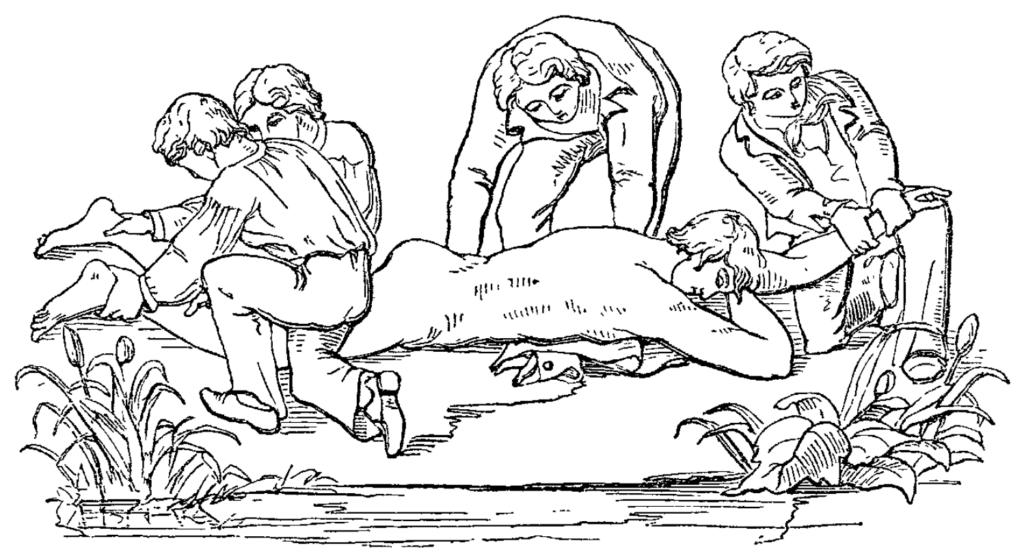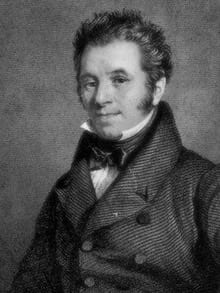Marshall Hall
Marshall Hall (1790 – 1857) was an English physician, physiologist and humanitarian
Hall is remembered now for his important contribution to the discovery of reflex action, denounced as an absurdity in England and applauded in Germany by Johannes Mueller.
His contributions to medical literature include the principles of clinical diagnosis; effects of trauma and blood loss; diseases of women; irritability; seizures; and diseases of the nervous system. He also wrote on social problems, including slavery in the United States.
Biography
- Born on February 18, 1790 in Nottingham, England
- 1809 – started medical studies at Edinburgh University
- 1811 – elected senior president of the Royal Medical Society (University of Edinburgh Medical School student society)
- 1812 – graduated with an MD and immediately began work as house physician at the Edinburgh Royal Infirmary
- 1825 – appointed physician to the Nottingham General Hospital
- 1832 – discovery of the reflex action by observing the muscular movements of a dead newt and caused much controversy. The Royal Society refused to publish two of his papers on the topic and led to difficulty finding a physician appointment at any London hospital despite his previously high esteem.
- 1842 – Goulstonian Lecturer after belated election as F.R.C.P
- 1842 – 1846 lecturer at St. Thomas’s Hospital
- 1850 – 1852 Croonian Lecturer
- Died on August 11, 1857
Medical Eponyms
Marshall Hall ‘Ready Method’ of treating asphyxia (1856)
If there be one fact more self-evident than another, it is that artificial respiration is the sine qua non in the treatment of asphyxia, apnoea, or suspended respiration
Marshall Hall, 1856
A YOUNG friend of mine has proposed to designate the postural treatment of asphyxia the ready method, no apparatus of any kind being required. I have adopted the suggestion.

Romberg Sign (1836)
Key Medical Attributions:
Neurological landmarks
Marshall Hall recognized and described:
- the cerebrum as the source of voluntary motion;
- the medulla oblongata as the source of respiratory motion;
- the spinal cord as the middle arc of reflex function.
I incidentally observed a remarkable phenomenon; the separated tail of the eft [newt] moved on being irritated by the point of the scalpel … I conceived it impossible that any such phenomenon should exist in nature without such connection, and I resolved to pursue the subject
Marshall Hall 1841
Animal rights and welfare (1835)
He was also a proponent of animal rights and in 1835 outlined five principles for animal experimentation in Principles of Investigation and Physiology. To paraphrase:
- An experiment should never be performed if the necessary information can be derived from observations
- No experiment should be performed without a clearly defined, and obtainable, objective
- Scientists should be well-informed about the work of their predecessors and peers in order to avoid unnecessary repetition of an experiment
- Justifiable experimentation should be carried out with the least possible infliction of suffering (often through the use of lower, less sentient animals)
- Every experiment should be performed under circumstances that would provide the clearest possible results, thereby diminishing the need for repetition of experiments
Controversies
Excito-secretory system – Dr Henry Fraser Campbell published a letter to the editor in the Lancet in 1857 addressed to Marshall Hall claiming discovery of the excito-secretory system as early as 1850. This was in response to works by Marshall Hall citing the excito-secretory system as worthy of further investigation but not referencing Campbell for coining the term.
Slavery – towards the end of his career, Hall became a stout abolitionist campaigning against slavery in the United States.
Temper
Major Publications
- Hall M. On the reflex function of the medulla oblongata and the medulla spinalis. Philosophical Transactions of the Royal Society of London B 1833; 123:635-65.
- Hall M. Observations on blood-letting founded upon researches on the morbid and curative effects of loss of blood. 1830
- Hall M. A critical and experimental essay on the circulation of the blood. 1831 [Crush injury and Haemorrhagic shock]
- Hall M. Lectures on the nervous system and its diseases. London. 1836 [‘Romberg’s sign’ description pp20]
- Hall M. Memoirs on the nervous system. London, Sherwood, Gilbert, & Piper 1837
- Hall M. On the diseases and derangements of the nervous system. London, Bailiere 1841
- Hall M. New memoir on the nervous system. 1843
- Hall M. Essays on the theory of convulsive diseases. 1847
- Hall M. Synopsis of the diastaltic nervous system. 1850
- Hall M. Synopsis of cerebral and spinal seizures. 1851
- Hall M. On the threatenings of apoplexy and paralysis. 1851
- Hall M. Synopsis of apoplexy and epilepsy. 1852
- Hall M. The two-fold slavery of the United States; with a project of self-emancipation. 1854
- Hall M. On a new mode of effecting artificial respiration. Lancet 1856; 67(1696): 229
- Hall M. Asphyxia, its rationale and its remedy. Lancet 1856; 67(1702): 393-394
- Hall M. The ready method in asphyxia. Lancet 1856; 68(1730): 458-459
- Hall M. Abstract of an investigation into asphyxia: its nature, carbonic acid blood-poisoning, and its remedy, prone and postural respiration. London: Churchill. 1856
- Hall M. The danger of all attempts at artificial respiration, except in the prone position. Lancet; 1857; 69(1745): 134-135
- Hall M. Prone and postural respiration in drowning and other forms of apnoea or suspended respiration. London: Churchill. 1857
References
Biography
- Hall C. Memoirs of Marshall Hall. London: R. Bentley. 1861
- Manuel DE. Marshall Hall, F.R.S. (1790-1857); a conspectus of his life and work. Notes and Records of the Royal Society of London. 1980 Dec;35(2):135-66.
- Biography: Marshall Hall. Lives of the Fellows of the Royal College of Physicians of London. Munk’s Roll: Volume IV, page 27
Eponymous terms
- Jarcho S. Marshall Hall on crush injury and traumatic shock (1831). Am J Cardiol. 1967; 20(6): 853-6
- Campbell FC. A claim of the priority in the discovery and naming of the excito-secretory system of nerves. 1857
- Pearce JM. Marshall Hall and “Romberg’s sign”. J Neurol Neurosurg Psychiatry. 2005; 76(9): 1241.
- Baskett TF. Resuscitation greats: Marshall Hall and his ready method of resuscitation. Resuscitation. 2003 Jun;57(3):227-30

eponym
the person behind the name

